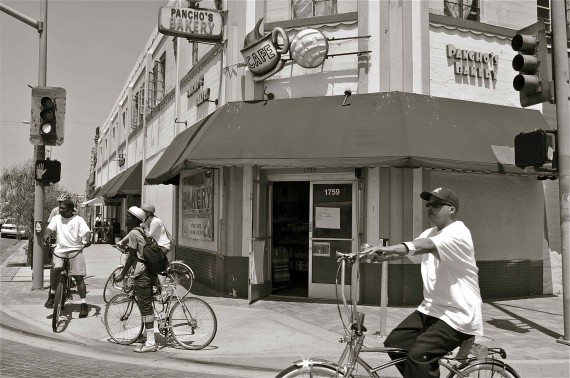As a child, I had dreamed of becoming a diplomat. A product of the cold war who occasionally had nightmares involving mushroom clouds, I threw myself into Soviet Studies in college, honed my skills in several of the UN's official languages, and prepared intensely for the foreign service exam. When the cold war ended (with no help from me, I might add), I shelved my ambassadorial aspirations.
Thanks to the LACBC's Neighborhood Bike Ambassador Program, it looks like I will be able to dust off those lofty aspirations and put them to use in South L.A.
Admittedly, bike ambassadorhood is not on the same level with preventing a nuclear holocaust. Still, I enjoyed the first meeting, convened last week at USC, and look forward to working with the LACBC and others in South L.A. to engage local communities and officials about cycling issues.
The program, as presented by LACBC Policy and Campaigns Manager Alek Bartrosouf, seeks to build grassroots support among neighborhood councils and community groups for the implementation of bike projects. This support is necessary, the LACBC contends, to ensure that the city follows through on promises to implement elements of the bike plan and other bike-related projects. Without voices in favor of these projects, loud voices complaining about the inconveniences of bike lanes, bike corrals, and the like may be the only ones heard, giving the city an excuse to back away from its promises to cyclists.
Ambassadors will be tasked with building that support in four key ways: advocacy (attending neighborhood council meetings and pressuring local officials), communication (educating cyclists and non-cyclists about the benefits of bicycle infrastructure, bike etiquette, etc.), events (holding fun events to attract people to and inform communities about cycling), and membership (building a base of members within the LACBC to give it a greater presence in the political process).
The only problem with the approach to the program is that the meeting unsurprisingly drew the usual suspects: three people from the LACBC, a triathlete/graduate student at USC, myself, and three faculty/staff from USC (some of whom are behind RideSouthLA). A few of us breathed a sigh of relief when two members of the East Side Riders (ESR) walked in and we could legitimately say we had some South L.A. representation.
Even with the valuable perspectives shared by the members of the ESR, there is still much to be done with regard to reaching out to and engaging cyclists in South L.A. before we can work to effectively promote their interests. As I recently argued with regard to the LA/2B project, genuine engagement of these cyclists and community members has to happen so we can be sure we're promoting the changes people want to see in their communities, not the ones we feel are best for them.
Many of those who ride in the area do not see themselves as part of the bike community -- or even know there is such a thing -- and would not necessarily see the bike projects promoted by the LACBC as beneficial. Even something simple, like the installation of bike racks or corrals in business districts, for instance, are only a great way to encourage cycling in a community if those that are riding have viable locks or they can put helmets on their kids. For low-income riders, these are sometimes accessories that are out of reach.
In other words, to win people's support for the installation of infrastructure, you may also need to couple your efforts with programs designed to make it easier for people to use it. But you can only know what a project should entail by first engaging riders from the area on their needs.
Bartrosouf was quick to point out that the goal of "communication" was flexible enough for us to incorporate that kind of outreach and that he was open to suggestions for innovative ways to reach out to those groups. We tossed around ideas such as rotating meetings through different parts of South L.A., linking educational components with any community events we hold, and producing a photo-heavy newsletter that could be available in bike shops in the area.
Whatever we decide upon as a strategy, we are most certainly going to need more bodies. So, if you live or work in South L.A. and want to get involved in the ambassador program, we'd love to have your input. You can get in touch with the LACBC about the program here.





